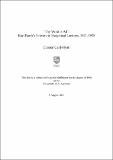Files in this item
'Thy word is all' : Karl Barth's university exegetical lectures, 1921-1928
Item metadata
| dc.contributor.advisor | Elliott, Mark | |
| dc.contributor.advisor | Webster, J. B. (John Bainbridge) | |
| dc.contributor.author | Card-Hyatt, Carsten | |
| dc.coverage.spatial | 178 p. | en_US |
| dc.date.accessioned | 2018-07-23T10:22:13Z | |
| dc.date.available | 2018-07-23T10:22:13Z | |
| dc.date.issued | 2017 | |
| dc.identifier.uri | https://hdl.handle.net/10023/15635 | |
| dc.description.abstract | This thesis argues that Karl Barth’s exegetical lectures of the 1920s were guided by the need to reckon with the Bible’s claim to authority and to understand how this authority was derivative of the sovereign authority of God made known in revelation. The authority of the Bible communicates God’s claim on creatures and so obligates those who read it to recognise and respond to the moral and spiritual reality that is disclosed in its pages. Initially, these themes are located in Barth’s first two exegetical lectures in Göttingen. It is argued that in these lectures Barth shows a tension between God’s transcendence in revelation and the personal relationship of faith. This claim is substantiated by a historical excursus on Barth’s use of the distinction between the ‘two principles’ of Protestantism, which is how he orders the priority of Scripture throughout his career. It is argued that there is a persistence of 19th-century anxieties about scriptural authority within the church in Barth’s thought, which are traced through his teacher Wilhelm Herrmann’s understanding of revelation. These issues are carried over into his exegesis in the first half of the 1920s, yet a growing awareness of the meaning of Christ’s history as the object of faith mitigates earlier tensions. This line of thought culminates in Barth’s lectures on John, where he works through the implications in his exegesis of Jesus Christ revealing the electing God. This allows for a more positive account of the relationship of witness and revelation than had previous been possible. This position is contrasted with Barth’s colleague Erik Peterson. Finally, the significance of this account of revelation for Barth’s understanding of the authority of Scripture as the authority of the neighbour is shown in relation to Barth’s exegetical lectures from the late 1920s. | en_US |
| dc.language.iso | en | en_US |
| dc.publisher | University of St Andrews | |
| dc.subject.lcc | BX4827.B3C28 | |
| dc.subject.lcsh | Barth, Karl, 1886-1968--Contributions in Biblical exegesis | en |
| dc.title | 'Thy word is all' : Karl Barth's university exegetical lectures, 1921-1928 | en_US |
| dc.type | Thesis | en_US |
| dc.contributor.sponsor | University of St Andrews | en_US |
| dc.type.qualificationlevel | Doctoral | en_US |
| dc.type.qualificationname | PhD Doctor of Philosophy | en_US |
| dc.publisher.institution | The University of St Andrews | en_US |
This item appears in the following Collection(s)
Items in the St Andrews Research Repository are protected by copyright, with all rights reserved, unless otherwise indicated.

